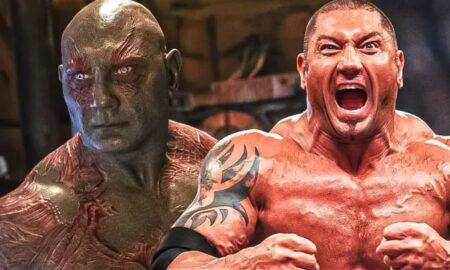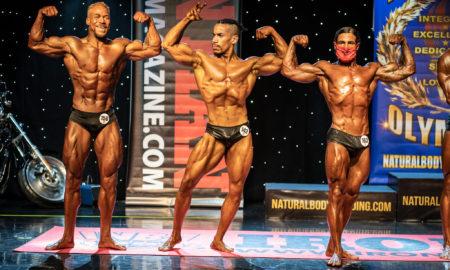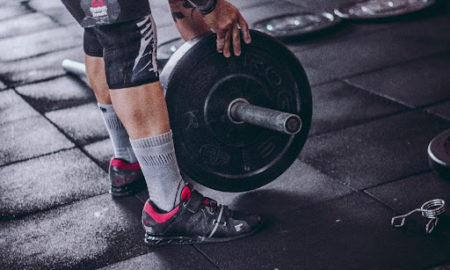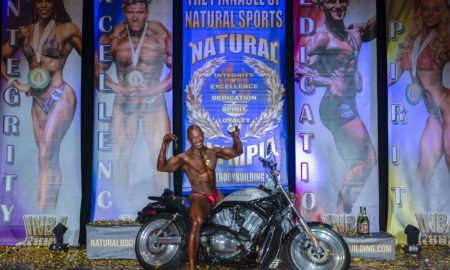It didn’t take long after I sat down with Danny Hester for me to find a new moniker for a guy I first introduced onstage nearly two decades back: Hester the Jester. He cuts up as much in conversation as he does on a bodybuilding stage. That trait, he says, must have been picked up during the days when he was training with Flex Wheeler.
Don’t think for a moment, though, that this cat isn’t all business both on and off the posing platform. At 41 he’s one of my favorites to win the middleweight class at this year’s USA or Nationals. He’s also a former nurse who worked at a mental institution, loves animals and hates bullies and is dead serious about marketing his G Flex workout equipment, for starters.
So let’s get up close and personal with this very unique muscle freak.
The Danny Hester File
Age: 41
Current residence: Venice, California
Height: 5’6’
Weight: 170 (contest), 180 (off-season)
Occupation: Designer of exercise equipment and CEO of an infomercial company
Contest highlights: ’96 NPC USA Championships, middleweight, 3rd; ’96 NPC National Championships, middleweight, 3rd; ’94 IFBB North American Championships, middleweight, 2nd; ’93 NPC California Championships, middleweight, 1st
Factoids: His father was part Cherokee, and his mother is from Thailand. He earned a nursing degree from Ventura College.
LT: You seem to have put a stop sign on the aging highway. You’re not looking much different from the first time I saw you back in 1992. You placed in the top five at both the USA and Nationals at 23 years old. You’re now 41, and you not only haven’t changed much but might look even better. What’s in the water, guy?
DH: Actually, I do drink a lot of water—so much in fact that I constantly have to go to the bathroom. And yes, I have had my prostate checked—no problems—although I have been compared to Niagara Falls at times. [Laughs]
I think that my youthful look can be attributed to keeping my stress level low. I laugh often, especially at myself. When I do get stressed out, I exercise. It makes me feel productive and in control. When I’m frustrated or angry, I try to be around nature; moving water, like a stream or the ocean, is especially calming and centering to my soul.
And then there are my pets—especially my dog Elvis.
LT: Elvis? He must be a hound dog. [Both bust up]
DH: Not quite. No, he’s a miniature Doberman pinscher. Pets are a great source of comfort. Caring for them takes my mind off of things and lightens up any bad mood I may be in. That’s why we all need to adopt a pet from a shelter.
My friend Chance runs a non-profit rescue in Santa Monica that I help out with. It’s called Good Dog Animal Rescue; they have some beautiful animals that are so in need of good, loving homes.
LT: You competed mostly as a middleweight. How much did you weigh in the off-season back then, and how much do you weigh currently?
DH: I stay around 175 to 180 year-around, the same weight as I carried throughout most of my career. I feel it’s a respectable weight for having lean muscle and symmetry for my height, and it’s a weight that doesn’t put a lot of extra stress on my body. Stress ages everything.
LT: Why are you zeroing in on my hairline after saying that?
DH: [Laughs loudly] I keep a close eye on my bodyfat and have it tested once a week at Max Fitness Academy in Sherman Oaks [California]. They have the most advanced and accurate customized system called Bodymap. It uses bioelectronic impedance and reads your entire bodyfat-to-muscle ratio from head to toe—even measures the water in your body composition. My off-season bodyfat is around 9 percent, and my competition bodyfat is 5 percent.
LT: Do you plan to get back onstage anytime soon?
DH: I love to compete, and I’m considering the USA or the Nationals. I will probably do a great show before that, though. It’s called the West Coast Classic. The promoter has a similar name to yours. Some big shot I think. [Laughs]
LT: Quit with the flattery; where’s your entry form? [Both laugh] If you earn a pro card, I imagine your goal will be to compete in the 202-and-under division. How much size can you pack on at your height without losing the flow of the physique you’re known for?
DH: If I did decide to compete on the pro circuit, it would be at 195 pounds onstage. I feel I could be a force to be reckoned with, in any weight category. The bodybuilding world has not seen such a balanced physique before, not even on my homie Flex Wheeler. Remember, he took second in his very first Olympia in 1993 at only 218 pounds [at 5’10”].
Now, I know this sounds brash, but I feel this way because at 170 I look a lot bigger than I actually am, but I’m still very symmetrical. Every five pounds I put on looks like 10 pounds—and all my bodyparts grow evenly. I always aim for complete balance in my physique. So 195 would be 25 pounds more than when I competed last but would look like around 220 to 225 onstage—bigger and thicker but still lean, with good lines.
LT: Are you from a large family?
DH: Yes. I have three brothers: Tom, 52; David, 42; and Billy Jr., 39. I have two sisters, Diane and Lisa, but I don’t dare give out their ages for fear of retribution.
My beautiful mother’s name is Somprasong. My father, Billy, died when I was two. He worked for the CIA during the Vietnam War and died in a plane crash in the jungles of Laos while on a mission. It took 14 days just to get to the crash site, so who knows if the body was really ever recovered.
My brothers and I used to imagine him coming back someday a hero and being proud of the way we were growing up. In some ways not knowing my father, only his courageous past jobs, was a good thing. I could create this honorable, heroic strong idea of him to look up to and aspire to be like. I feel that—and the strict and humble Asian influence of my mother—kept me from getting into too much trouble. I always try to be a person of integrity unless you mess with my family or people I care about. Then it’s no holds barred!
LT: You were raised in Ventura, about 50 miles up the coast from Los Angeles. Were you an athlete in high school?
DH: Yes, I was a great athlete. I wrestled in high school and at Moorpark Community College, but I didn’t like the politics of team sports. The coaches were always playing favorites. Wrestlers are probably the best all-around athletes. In individual sports you determine your own fate by how much you put into it. There’s no coach to kiss up to who decides who plays. You also don’t have to suffer a loss because other people didn’t carry their own weight.
Wrestling and bodybuilding are very similar in many ways. They both require strict diets while doing a lot of hard training before competitions and matches. You have to make weight and really monitor your water intake.
You have to keep confident and not worry about how good your opponent might be so you don’t stray from your game plan. Being around wrestlers and bodybuilders most of my life, I even see similarities in the types of people they attract—they are both a little quirky and rebellious, in a good way, with a great sense of humor for the most part. Both types welcome a challenge but never go looking for it.
LT: When did the bodybuilding bug hit you? Did anybody in particular inspire you?
DH: I started reading bodybuilding magazines when I was a sophomore in high school. It was probably during puberty when I started seeing my genetic potential develop. I was inspired by symmetry and condition more than the mass monsters. Guys like Mohamed Makkawy Ed Corney, Serge Nubret, Lee Labrada, Bob Paris, Francis Benfatto and even that guy Shawn—I can’t quite recall his name.
LT: Don’t worry, Sugar Shawn Ray will e-mail you seconds after he reads this interview to remind you. So you eventually moved to Venice, and now you go back and forth between Venice and Ventura. Explain.
DH: I moved to Venice in the early 1990s because it’s where everything is happening relevant to what I do in the fitness industry. Ventura is where my mom and most of my family live. I visit them often because they keep it real when I start getting too Hollywood. It’s a beautiful 50-minute drive up Pacific Coast Highway to Ventura County.
LT: Of course you train at Gold’s when in Venice; where do you work out in Ventura? How does it compare to the mecca?
DH: I train at Powerhouse Gym in Oxnard [the city where IRON MAN’s offices are located]. It’s the only serious gym around. They care as much about results as they do about selling memberships. No balloons in this place! They have great equipment and are hungry for knowledge. Everyone trains hard.
I get my cardio training in by boxing at World Crown Sports in Oxnard. I get trained in boxing by the owners and head trainers, Adam and Cecilio Flores. They are the best and currently work with several world champions.
Gold’s, Venice, is the mecca because of its history and clientele. It’s always a who’s who of pro bodybuilders, pro athletes and famous actors working out. It’s very motivating when I’m training arms next to people who are really famous, and they are staring at me because of the shape I’m in. They will give me a compliment, just like one of their fans would compliment them. It’s pretty cool to have a superstar envy you in some way.
LT: You are far from a limited individual. For one thing, after you earned your nursing degree in 1988, you landed a job at a very interesting place.
DH: Yes, I did. I worked as a nurse at Camarillo State [Mental] Hospital, just south of Ventura. That really taught me about respecting people, no matter what shape, physically or mentally, they are in. I had the opportunity of seeing into the lives of people before and after illness landed them in the hospital. It really humbled me; I worked in all of the units, from 12-to-17-year-old kids who were removed from their homes due to abuse, to schiziophenic adults who at one point were doctors and lawyers.
We, the nurses, were the eyes and ears of the doctors and were obligated, both morally and legally, to know everything that was going on with each patient who was in our charge. The entire experience was a complement and an asset to my fitness career because it taught me empathy, patience and discipline, necessary tools for both competitors and trainers alike. Those traits are critical when you’re training hard and on a strict diet.
LT: And from there?
DH: Two years into my employment at the hospital I saw a notice posted at the nurse’s station for a position in state law enforcement. It seemed exciting and would be an easy transition since I was already overseeing people who were under lock and key. I went through the academy for corrections and was placed right away at a facility in Southern California, in charge of convicted murderers and rapists. Wow, what was I thinking? I had gone from the prey of society straight to the predators. I quickly needed to earn respect and build rapport with the inmates. The best way I could do that was to utilize what I had in common with them—bodybuilding and strength.
It was a productive way for them to gain control and respect. Since I was already pretty successful in bodybuilding at the time, winning shows and collecting trophies, I decided to have my own bodybuilding and strength competition where the inmates could compete.
I would remove all the plates from my trophies and give them to the winners. I was happy I could make a difference in their lives, but after three years there it was wearing on my spirit and psyche, and I felt it was time to move on. It wasn’t easing leaving; you become sort of a family in a way, and I had to give up the privilege of carrying a concealed firearm off-duty. Fortunately, I had already found a new family in bodybuilding, and I was still able to carry concealed weapons—18-inch guns.
LT: Now that you have passed the 40 mark, has your training style changed?
DH: Oh, yeah. I’m still just as strong but choose not to go heavy as often. I’m still as flexible, but I take a little longer to warm up these days. I am more conscious of the mind/body connection and making sure that my form is correct.
LT: What about your eating habits, then and now?
DH: Really, about the same. I eat as I’m hungry, which is about every 2 1/2 hours. I just keep my carbs under 140 grams a day, my protein about 300 grams, fats as low as possible and plenty of veggies and fruit.
LT: What’s your favorite bodypart to train—and your least favorite?
DH: Some people would say my mouth because I’m always joking around and wisecracking. I think that I was influenced by my old training partners, Rico McClinton and Flex Wheeler, who were big cut-ups back then.
My favorite bodypart to train changes. Some days it could be arms, another day it could be any of the other bodyparts. The least favorite would be forearms. I don’t feel you need to train them specifically if you lift heavy weight because they will grow from just your trying to keep gripping the bar.
LT: What does a typical Hester workout week look like?
DH: I wake up planning to train every day, but that always can’t happen, due to my work schedule. The days that I can’t train will be my days off. That happens about twice a week—but it usually doesn’t throw off my workout schedule.
LT: Of all the different workouts you’ve employed over the years, which would you say is the most efficient?
DH: One would have to be instinctive training. That means you should be feeling the pump and the mind/body connection on the movement. If you’re not feeling the pump or the connection, then immediately move to another exercise. Nothing is worse than going through the motions and burning up all your ATP. It will kill your progress and motivation.
The other form of training I like is circuit training. That’s when you keep a medium-to-high heart rate and quickly move from one exercise to another. I do one exercise for each bodypart until I cover my entire body. It takes 10 minutes to complete the circuit. You repeat the circuit two more times for a total 30-minute workout. I do it on my G Flex invention. It’s much more efficient than the machines at the gyms because you don’t have to fumble around with switching machines or weights. With the G Flex I can go from one exercise to another in two seconds and change the resistance just as fast by moving my foot position forward or backward. I get a crazy, full-body pump and, when I’m finished, I’m drenched in sweat!
LT: Tell me more about G Flex.
DH: I have invented and patented fitness equipment that’s sold in almost every gym in the world. I started a direct-response TV company that markets and sells G Flex. It’s a portable complete-body workout system. It’s a unique, patented pulley system that uses your own bodyweight against gravity for resistance; hence the name. The infomercial for the product [with Hester as the host] should be airing on television by the time this issue is on the newsstands. It’s great to take an idea or vision, work hard and have it come to fruition.
LT: You’re a 22-year vet in the game. Any advice to young kids who love bodybuilding and think they’ll be the next Arnold?
DH: Always respect the guys who came before you because you would want the same respect after you’re done competing. Don’t stop trying to obtain your goal just because things seem to stop progressing toward it. I tried to get financing for one of my big projects that I really believed in. I signed deals with big investors, but they had to back out because they lost all their money in the stock market and housing crash.
That actually happened two times in a row with the same project. You can imagine after two investors and two years of trying I was pretty disappointed. I still believed, though, and still kept working at it. I finally got the financing, and the product will be advertised on TV and sold in all the stores worldwide by this summer.
LT: Anything in particular that stands out in your career to date?
DH: Competing successfully in many top bodybuilding shows has resulted in being on magazine covers and getting large supplement-endorsement contracts. My notoriety in the fitness world has given me credibility as a designer and innovator of fitness equipment. It has opened many doors and allowed me to get financing to bring my various projects to fruition.
LT: If you could do it all over again, what would you change?
DH: I would take advantage of the opportunities I came across and really milk the 15 minutes of fame they say everyone gets at least once. In my case I have had many, and I am finally making the most of it. Oh, and I would buy stock in Yahoo, Google and Walmart.
LT: You were in great shape when you rolled into Michael Neveux’s studio in late April—without a contest around the corner. Is it your philosophy to stay in top condition year-round, or do you do the Sherman Klump off-season look like so many competitors?
DH: I stay in great shape year-round because it gives me confidence and courage to battle the world in any situation. Bodybuilding competition doesn’t end on the stage; it continues in life. That’s why a true champion continues to train hard and stays ready and hungry for battle even when you don’t know when the next competition may be. Stay ready so you don’t have to get ready! Additionally, fitness is my livelihood, and you should always look the part. You always have to be ready when opportunities arise. When Mike Neveux called me, he wanted me in the studio in two weeks. I wouldn’t have landed this cover if I wasn’t in top shape.
LT: What would the readers be surprised to find out about you?
DH: I like the underdog. I don’t like bullies. If you’re mean, I can be meaner, and if you’re nice, I can be nicer. I usually tend to hang out with people who have talent and potential but haven’t quite made it yet. I think that’s why I like L.A. so much. The struggles and challenges are what keep life exciting and interesting; you know, the journey to success.
Speaking of success, I just want to give a shout out to my homeboy Mickey Rourke for all his achievements. And to thank him. One of my little puppies, Dori, needed heart surgery that cost thousands of dollars. Everyone was saying it was a risky, expensive surgery and wasn’t really worth it. I put a call in to Mickey, asking him where the best vet would be, since he has a lot of dogs. He told me to go to his medical group, that they are the best. So I did and picked up the puppy after a successful surgery—and was floored to find out that Mickey had paid the bill! That’s the type of guy he is.
I witnessed Mickey going through a lot of hard times over the 15 years I’ve known him. When he made it back on top of his game, I was very proud of him but not surprised. I hope Mickey enjoys his new success—but I think he may have had just as much fun being the underdog.
LT: Just as you have.
DH: You know me better than I thought.
Editor’s note: To contact Danny Hester for appearances, including seminars on how to defy the aging process, write to hesterdanny@yahoo.com or visit www.GFlex.tv. IM
















You must be logged in to post a comment Login